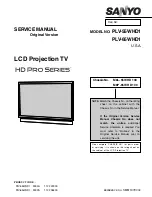
Activation
Level: 1.5”
1. Power system off.
2. Cut one wire going to the compressor contactor. (Step 2)
3. Connect Condensate Cop wires to the cut ends and install wire nuts. (Step 3)
4. Before mounting the Condensate Cop to the drain pan, test operation by
turning the Condensate Cop upside-down (inlet grill facing upward).
a. Power up system and set thermostat to call for cooling. Compressor should
not run.
b. Turn the Condensate Cop to the correct operating position. Float should
move to the bottom of the float housing and the compressor should start.
CAUTION: Rapid cycling of the compressor must be avoided to prevent
overload. DO NOT SHAKE the Condensate Cop during the system test.
c. It is recommended that you test the Condensate Cop and drain pan with
water to prove water tightness and shutdown operation.
5. Attach the Condensate Cop to the secondary drain pan.
See illustrations. Hand tighten only.
6. Adjust sensor probe position to touch bottom of drain pan. Probe may be
adjusted to compensate for drain pans with angled sides.
Hand Tighten Only
Position Float
Probe Vertically
Thermostat
Air Handler Condensate Cop
TYPICAL CONNECTION
3. Connect 2 wires
to cut ends
2. Cut
*For use with 24 VAC control circuits.
*Always test the system after
installation of any new control to
ensure compatibility.
SPECIFICATIONS:
CURRENT CAPACITY:
Can operate contactor coils requiring up to
1.25 Amps.
POWER REQUIREMENTS:
Operates in series with 24 VAC contactor load.
ACTIVATION LEVEL:
1.5 inch depth from bottom of probe.
®
Condenser
Condensate Cop
Installation Instructions
MODEL NO. CC-1
Patent Pending
800.995.2222
®
www.diversitech.com
Installation:




















